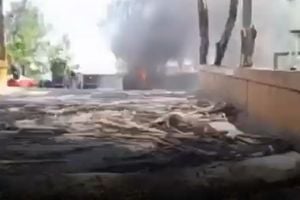
Chemase Police Post in Tinderet Constituency on fire after it was attacked and vandalised by an angry mob.
Two days ago, a fire breathing mob marched to Chemase Police Station in Tinderet Constituency, Nandi County and turned the infrastructure inside there upside down looking for a murder suspect who had been hiding under a rock.
They flushed him out with the green bile of a charged reptile, before stoning him to death under the open sun. A local media house has placed the number of villagers at the crime scene at 3,000—proving that you do not need to match Genghis Khan to compare notes with those constitutionally entrusted with the monopoly of violence.
All this happened under the watchful eye of armed police, who remained helpless as the angry mob cut the lifeless body into parts and arranged them against an open cell block for maximum effect, before cremating the resultant specimen in full glare of the protectors of government bureaucracy.
As the body was taking its time to assume the form of a pile of ash, the mob conducted a second coordinated tour of the station, torching any movable object with the remaining matchstick and flammable material they had crowd-funded.
There are government officials at the Ministry of Interior who will treat this as an isolated incident and prescribe remedies, including talking to the parents of the perpetrators to raise their children according to the teachings of the Bible and the mannerisms of traditional culture, lest a generational curse befall the entire village unless an exorcism ritual is conducted to appease the spirits of the dead.
Then there’s a category of law enforcement agents who shall be persuaded that this act of public rage should be dissected to reveal the internal organs bearing the underlying root causes of the disease, stretching from systematic breakdown of law and order, deteriorating citizen trust in public institutions and their officers, and historical injustices by government bureaucracy against victims of the cycle of poverty.
Asked which of the two categories above would stand a chance to solve this institutional mess that is threatening to put the entire country on edge, the second group of policy interventionists—on a balance of probability—stands the greatest chance at a positive result.
Effects of government neglect
What happened at Chemase is not a flash in the pan — it’s a down in the dumps culmination of a prolonged period of bottled magma that has been boiling underneath the hearts of helpless Kenyans suffering from the effects of government neglect, and finally exploding to take matters in their own hands.
There is a wide variety of life changing lessons the government of Kenya must take from this incident, if it is to continue holding onto its hard fought legitimacy. Let us go through a few important ones.
First — and most importantly — is that there is a reason the 2010 Constitution began with recognising the sovereignty of the individual and collective citizens.
Article 1 of our Mother Law reads: “(1) All sovereign power belongs to the people of Kenya and shall be exercised only in accordance with this Constitution; and (2) The people may exercise their sovereign power either directly or through their democratically elected representatives.”
Those who went to school to study law have consistently reminded us that the Constitution is not a suggestion and every article in there must be treated with the weight and gravity due to them.
As such, they hasten to add, that none of the provisions is superior to the other, and there will be consequences against those who elect to cherry-pick those clauses that further their agenda against the ones in favour of public interest.
What the people of Chemase did on Thursday is breathe life to Article 1 of the Constitution by reaffirming that power, indeed, belongs to the people and they can choose to exercise it directly, in instances where they harbour the guided feeling that those whom they delegated the power to have abandoned their Godly calling in service and chosen to put first their personal interest.
Acting in the public interest
Two, all governments, world over, bar none, exist to serve public interest. Acting in the public interest—at all times, as an overarching goal—is a concept that is fundamental to the core tenets of democracy and to good public administration.
Public officials—whom we often interchangeably refer to as government officials—are bestowed with the primary obligation to act, demonstrate, in word and in deed, that their oath of office is tried and tested on their ability to put the nation over self in the discharge of their official duties.
To act in public interest not only calls for the few—and far between Kenyans—who have attained self-actualisation, and who are called in service of their country, choosing to forgo the pleasures that come with personal comfort at any time of day or dead in the night, who love their jobs with the spirituality of a Zen monk and the passion of a young love, and who go about their jobs without prodding or jolt from a higher authority in the line of duty.
Acting in the public interest means solving local problems in situ, as they arise, with the little resources at your disposal, without providing excuses—justified or otherwise—with the end goal of non-escalation and the reassurance of public trust in government to alleviate suffering as immediate as it happens.
Any government that trains its officers, at whatever cadre of responsibility, to look the other way when public anger is building, especially on an endemic problem like insecurity, not only invites trouble, but also invites trouble to trouble it.
Lastly—and not least important—is that legitimacy cannot be bought. This lifesaving tip is self-explanatory, and the less said about it the better for everyone.
What happened at Chemase happened in a village in Murang’a barely two months ago. Same situation, same outrage, same methods, same result. Government agencies cannot make this stuff up, neither will they use old tactics of threats and intimidation to pacify public outrage over institutional neglect of public interest.
This could be the first trumpet. Might as well be the last.











